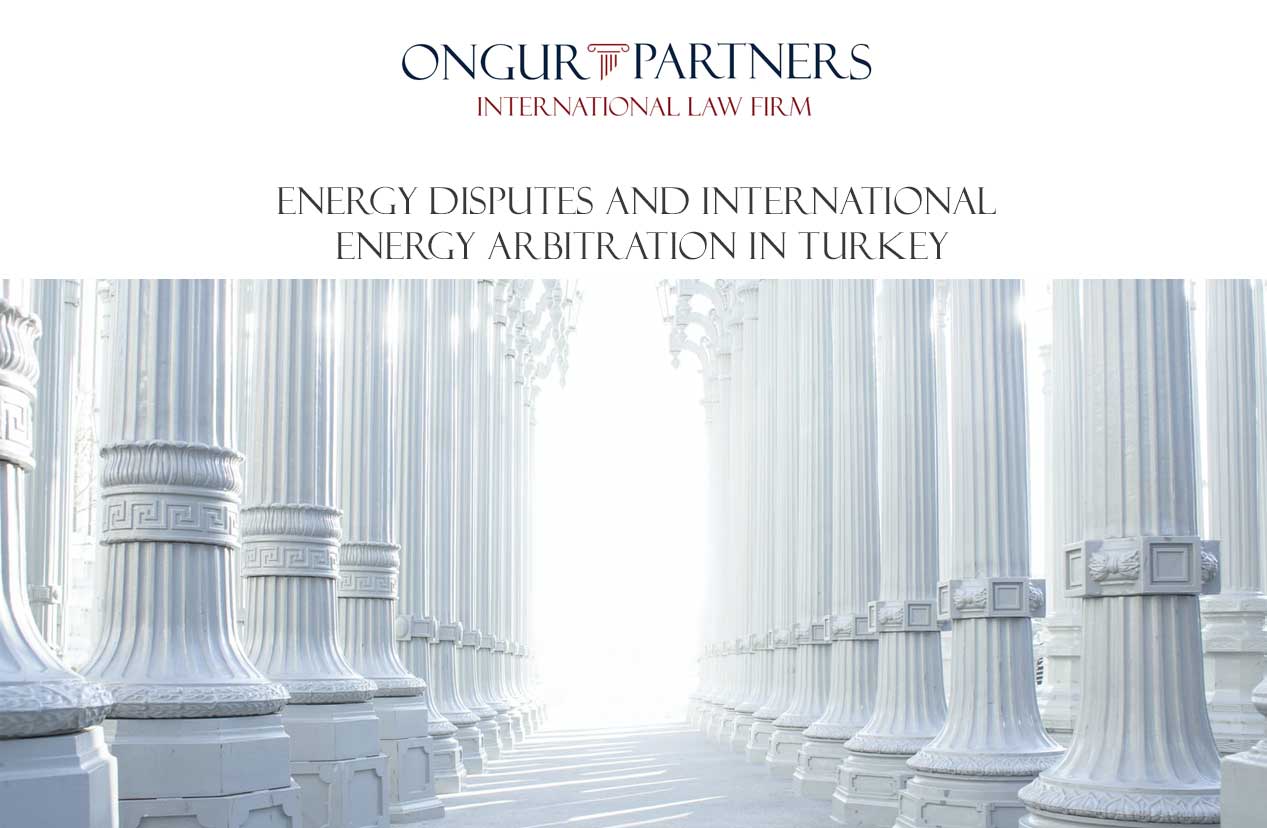The main purpose of this article is to inform readers about the assessment of energy disputes that arise in Turkey by international arbitration methods and in particular the ICSID arbitration process. The arbitration Lawyers in Turkey, have been dealing with many complex arbitration cases and the energy becoming a very dominant market in Turkey in the last decade for international arbitration disputes.
Introduction
Several rapid, transparent, and new legal resolution mechanisms are generated as an alternative to governmental adjudication since legal relations in social and commercial life becoming increasingly complicated and for which technical expertise is needed. One of the most frequently used components of this mechanism called “Alternative Dispute Resolutions” is international arbitration in Turkey. As an important market/player of the market, energy arbitration in Turkey is always on the agenda of Turkish arbitration lawyers as well as international arbitration practitioners in Turkey.
To start with, in Turkish law, in the most common terms, arbitration is defined as a mechanism that foresees to settle disputes, which are or to be arisen between the parties in a legal relationship, by arbitrator(s) who are assigned by the parties, instead of resolving the disputes through governmental adjudication. This mechanism aims to ensure that disputes which arise between the parties are rapidly, transparently and effectively settled by arbitrator(s), who are assigned by the parties, according to rules and principles determined by the parties, instead of resolving the disputes through the Turkish governmental judicial system in the classical sense; i.e. not by Turkish courts and Turkish judges.
Energy Disputes and Arbitration in Turkey
As it is generally known, the energy sector has a highly technical, capital-intensive, and complicated composition in its nature. Thus, some challenges are faced when disputes regarding the energy sector are sought to be resolved within the scope of governmental adjudication, as this issue necessitates technical expertise. Hence, it is possible to say that energy companies frequently prefer arbitration for settling their disputes, especially in recent years in Turkey.
In addition, investments in the energy sector are generally made as investments of multinational companies in developing countries including the Republic of Turkey. It is a fact that investors in the energy sector take a certain risk by their investment activities in developing or underdeveloped countries, and they mostly face reliability challenges with regards to the legal system of the invested country.
In this context, international arbitration draws attention as one of the most common methods used by multinational investors in Turkey for assuring equal, effective, and rapid dispute settlement in terms of their investments in Turkey. This required qualified and expert legal services regarding Turkish arbitration law services. Turkish arbitration lawyers and law firms trying the improve their international skills and service capacities to be able to perform their services in line with international standards.
Types of Arbitration Applicable to Energy Disputes
According to Turkish Law, arbitration is a method not only applied in international disputes but also applied in national disputes. Therefore, in Turkish Law, it is possible to review arbitration under two headings: national arbitration and international arbitration. Besides this classification, parties may agree on settling their disputes through arbitration before an expert institution or by “Ad hoc” arbitration under the Turkish legal system. Within this framework, arbitration can be reviewed under two headings: “institutional arbitration” and “Ad Hoc arbitration”.
It is a fact that especially disputes regarding energy are mostly settled by institutional arbitration in practice in Turkey. While organizations with expertise in institutional arbitration may vary, the most important ones can be listed as ICSID, ICC, LCIA, Arbitration Institute of Stockholm Chamber of Commerce, Istanbul Arbitration Center and Milan Chamber of Arbitration.
Energy Disputes and International Centre for Settlement of Investment Disputes (ICSID)
ICSID (International Center for Settlement of Investment Disputes) is an organization established under The World Bank by ICSID Convention in 1965. Central administration of the organization is located at the same center with The World Bank in Washington/ USA. Today, there are a total of 140 contracting states of ICSID; Turkey has been a contracting state of ICSID since 1988. ICSID Convention creates an arbitration venue displaying activities on disputes which are or to have arisen between investing companies and invested states.
Therefore, there are three pillars of ICSID arbitration: the first pillar is a contracting state of ICSID Convention where investment will take place; the second pillar is an investing company registered in one of the contracting states of ICSID Convention, and the third pillar is an investment to be made by the said investor. Thus, it is seen in ICSID arbitration that one of the parties must be a contracting state of ICSID Convention and the other party must be a company or companies that are investing in said contracting state and registered in one of the contracting states of ICSID Convention.
Dispute Settlement in ICSID Arbitration
In accordance with Article 36 of ICSID Convention, a state or an investing company, which wishes to settle their dispute by arbitration before ICSID, sends a written claim (request for arbitration) to the arbitration center. In the arbitration claim, the following should be stated: name and surname of the parties; the subject of the dispute; and consent of the parties for settlement of the dispute through ICSID, in other words, the arbitration clause. If ICSID has judicial power for the dispute, of which arbitration claim is received, ICSID Secretariat sends a copy of this arbitration claim to the counterparty.
Pursuant to Article 37 of the ICSID Convention, one or more arbitrators, in odd numbers, are assigned by the parties. If the parties cannot agree on the number of arbitrators to be assigned, proceedings are carried out by 3 arbitrators. In such a case, each party assigns their own arbitrators, and these arbitrators unanimously determine a third arbitrator before the arbitration begins. Parties must agree on jurisprudence that shall be applied in the arbitration process.
If the parties cannot come to an agreement on jurisprudence that shall be applied between the parties, the arbitration process shall be based on arbitration jurisprudence of the invested state. At first, necessary observations and evaluations in connection with the dispute are carried out by the arbitrators, and then arbitrators unanimously decide on the application of arbitration.
Turkey and Arbitration
The arbitration method has found its field of practice in the Turkish legal system, as the result of some essential legal and constitutional changes in the past decade in Turkey. It is clear after these changes that arbitration in Turkey -whether as a seat or as the dispute resolution method in the legal relationships with parties from Turkey- is feasible. Decisions of the Arbitral Tribunals are easily enforceable in Turkey.
In this regard, it is possible to observe that today most of the companies in Turkey as well as the governmental and administrative agencies see the arbitration as a natural component of the energy sector. There are important energy arbitration cases and decisions in which Turkey is a party whether the claimant or respondent.
The legal base of arbitration is established for ensuring that some public services to be given by foreigners through special legal contracts in Turkey in accordance with Law no. 4446 and dd. 13 August 1999 and amendments in 125, 47, and 155 Articles of the Constitution dated 1982 as well as Laws no. 4875, 4501, and 4868 entered into force following the latter.
In this process, this has provided the opportunity for settlement of disputes through international arbitration which will arise on assigning foreigners for some public services, especially in the energy sector. However, foreign investors started to apply to the arbitration mechanism, after some procedures nullified under judicial control, especially the procedures that are established by the management, or legislators amended legal regulations, which were in force at the date when foreign investments took place, in Turkey.
Disputes for Which Turkey Is a Party Before ICSID
As it is known, investors may directly bring an action against the legal entity of the invested state before the ICSID mechanism. There are legal actions brought against the Government of the Republic of Turkey before ICSID, and these cases are closely followed up by the press and the media. Besides, there are also legal actions brought before ICSID against third party states by some companies registered in Turkey.
Without a doubt, the biggest dispute in terms of its value with regards to the Republic of Turkey in the case brought by Libananco Corporation against the Government of Republic of Turkey before ICSID (Case No: ARB(AF)/06/2).
This action was brought by Uzan Group as the result of the dispute regarding termination of concession agreements on the grounds that requirements of the concession agreements are not fulfilled with regards to Çukurova Elektrik and KEPEZ; Libananco Corporation, which is registered in South Cyprus and claims to be a shareholder of the corporation, applied ICSID arbitration against the Government of the Republic of Turkey. As a result, the Tribunal has decided that it has no jurisdiction over the present case as Libananco has not proved that it owned shares in ÇEAŞ and Kepez before 12 June 2003.
Another action brought against the Government of the Republic of Turkey before ICSID is the case where PSEG Global Inc., The North American Coal Cooperation and Konya Ilgın Elektrik Üretim ve Ticaret Ltd are applicants because of their energy investment to be made in Turkey (Case No: ARB/02/5). In consequence of the case, ICSID arbitral tribunal decided that the Government of the Republic of Turkey shall compensate the Applicants, foreign investors, because of unilateral (ex-parte) changes in the investment conditions.
When it comes to actions brought against the invested states by the investors registered in Turkey before ICSID, the examples can be given as follows: the action brought against the Government of Pakistan by Bayındır Inşaat Turizm Ticaret ve Sanayi AŞ because of the dispute regarding investment for a highway project (Case No. ARB 03/29). Another example is the action brought against the Government of Azerbaijan by Barmek Holding AŞ before ICSID because of the dispute regarding energy investment (Case No. ARB 06/16).
Conclusion
Globalization has significant impacts in the field of law as much as in all other sectors. International investors and investments resulted in mechanisms that provide rapid settlement of many disputes independently of national adjudication, especially in the energy sector in Turkey. Pursuant to international treaties, where the Government of the Republic of Turkey is a contracting party, international investors should fulfil some liabilities for their investment commitments in Turkey.
By taking into consideration that Turkey is a country that grows rapidly and attracts the attention of foreign investors, it is crucially important that possible disputes are minimized. Indeed, experienced arbitration lawyers in Turkey and Turkish Arbitration law firms can guarantee the protection of the investment and security of the business in terms of energy investments by using legal protection mechanisms. This may be the beneficiary for the foreign companies registered in Turkey and investing in the Turkish energy market.



